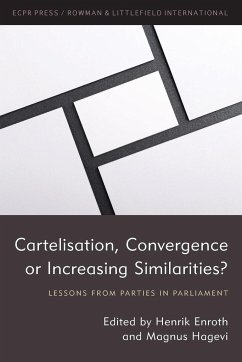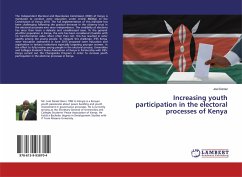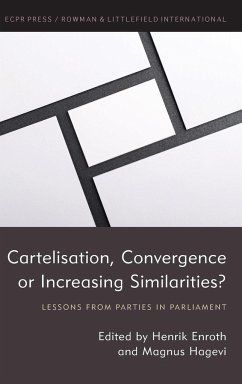Lars Rößger, Michael G. Lenné
Increasing Motorcycle Conspicuity
Design and Assessment of Interventions to Enhance Rider Safety
Lars Rößger, Michael G. Lenné
Increasing Motorcycle Conspicuity
Design and Assessment of Interventions to Enhance Rider Safety
- Gebundenes Buch
- Merkliste
- Auf die Merkliste
- Bewerten Bewerten
- Teilen
- Produkt teilen
- Produkterinnerung
- Produkterinnerung
How driving simulation, field studies and laboratory experiments can be used to improve rider safety is illustrated in this text. It outlines the factors that contribute to the visibility of powered-two-wheelers (PTWs) and their detection by car drivers, and presents case studies to illustrate how the various methods can be used to explore the contribution of these factors. The final chapter highlights the utility of a simulation-based approach to improving PTW safety and discusses this method's future applications.
Andere Kunden interessierten sich auch für
![Increasing Legal Rights for Zoo Animals Increasing Legal Rights for Zoo Animals]() Increasing Legal Rights for Zoo Animals56,99 €
Increasing Legal Rights for Zoo Animals56,99 €![The Fortune at the Bottom of the Pyramid: Eradicating Poverty through Profits The Fortune at the Bottom of the Pyramid: Eradicating Poverty through Profits]() Abdiqani EgalThe Fortune at the Bottom of the Pyramid: Eradicating Poverty through Profits18,95 €
Abdiqani EgalThe Fortune at the Bottom of the Pyramid: Eradicating Poverty through Profits18,95 €![Cartelisation, Convergence or Increasing Similarities? Cartelisation, Convergence or Increasing Similarities?]() Cartelisation, Convergence or Increasing Similarities?50,99 €
Cartelisation, Convergence or Increasing Similarities?50,99 €![Increasing youth participation in the electoral processes of Kenya Increasing youth participation in the electoral processes of Kenya]() Joel DanielIncreasing youth participation in the electoral processes of Kenya26,99 €
Joel DanielIncreasing youth participation in the electoral processes of Kenya26,99 €![Cartelisation, Convergence or Increasing Similarities? Cartelisation, Convergence or Increasing Similarities?]() Cartelisation, Convergence or Increasing Similarities?118,99 €
Cartelisation, Convergence or Increasing Similarities?118,99 €![Increasing Quality of Life ¿ the Goal and Indicator of the Development Increasing Quality of Life ¿ the Goal and Indicator of the Development]() Edvins KarnitisIncreasing Quality of Life ¿ the Goal and Indicator of the Development16,99 €
Edvins KarnitisIncreasing Quality of Life ¿ the Goal and Indicator of the Development16,99 €![Increasing the Citizens' EU Awareness Increasing the Citizens' EU Awareness]() Hannah CosseIncreasing the Citizens' EU Awareness44,99 €
Hannah CosseIncreasing the Citizens' EU Awareness44,99 €-
-
-
How driving simulation, field studies and laboratory experiments can be used to improve rider safety is illustrated in this text. It outlines the factors that contribute to the visibility of powered-two-wheelers (PTWs) and their detection by car drivers, and presents case studies to illustrate how the various methods can be used to explore the contribution of these factors. The final chapter highlights the utility of a simulation-based approach to improving PTW safety and discusses this method's future applications.
Hinweis: Dieser Artikel kann nur an eine deutsche Lieferadresse ausgeliefert werden.
Hinweis: Dieser Artikel kann nur an eine deutsche Lieferadresse ausgeliefert werden.
Produktdetails
- Produktdetails
- Verlag: CRC Press
- Seitenzahl: 258
- Erscheinungstermin: 28. März 2015
- Englisch
- Abmessung: 240mm x 161mm x 19mm
- Gewicht: 555g
- ISBN-13: 9781472411129
- ISBN-10: 1472411129
- Artikelnr.: 45061063
- Herstellerkennzeichnung
- Libri GmbH
- Europaallee 1
- 36244 Bad Hersfeld
- gpsr@libri.de
- Verlag: CRC Press
- Seitenzahl: 258
- Erscheinungstermin: 28. März 2015
- Englisch
- Abmessung: 240mm x 161mm x 19mm
- Gewicht: 555g
- ISBN-13: 9781472411129
- ISBN-10: 1472411129
- Artikelnr.: 45061063
- Herstellerkennzeichnung
- Libri GmbH
- Europaallee 1
- 36244 Bad Hersfeld
- gpsr@libri.de
Lars Rößger is Psychologist and Senior Research Fellow at the Unit of Traffic and Transportation Psychology at the Faculty of Traffic Sciences, University of Technology Dresden. Over the past 10 years he has been engaged in several national and international funded research projects dealing with various issues of applied psychology in the traffic and transportation sector. His main research interest include drivers' attitudes and behavioural changes, human decision-making in the context of traffic related decisions and drivers' visual attention and its means of measuring. Results of his research work are published in peer-reviewed journal papers and book chapters both on national and international level. His current research focuses on time perception and route related decisions in simulation scenarios. Mike Lenné is an Adjunct Professor (Research) at the Monash Injury Research Institute, Melbourne, Australia. He was awarded a PhD in Experimental Psychology from Monash University in 1998, and in 2014 was made a Professor at the Monash University Accident Research Centre where he had led the Human Factors research team for nearly eight years. His research over the past 15 years has centred on the measurement of human performance using human-in-the-loop simulation across road, rail, and military settings. While widely published, his research has had significant impacts on road safety policy and practice. His current research examines the impact of intersection and rail level crossing design on road user performance, and the role of distraction and drowsiness in crashes and development of associated countermeasures. Professor Geoff Underwood is Director of the Accident Research Unit at the University of Nottingham, and has served as the Head of the School of Psychology at Nottingham. His degrees are from the University of London (BSc, DSc) and the University of Sheffield (PhD). He is a Fellow of the British Psychological Society (FBPsS) and a Fellow of the R
Foreword, Stephane Espie. Part I Setting the Stage: Motorcycle Safety and
Conspicuity: PTW crashes and the role of perception, Zoi Christoforou,
George Yannis, John Golias and Peter Saleh Psychological factors in seeing
motorcycles, Vanessa Beanland, Michael G. Lenne and Lars Rossger Mechanisms
underpinning conspicuity, Geoff Underwood. Part II Case Studies Focusing on
Visual Saliency and Conspicuity Treatments: How conspicuity influences
drivers' attention and manoeuvring decisions, Geoff Underwood, Editha van
Loon and Katherine Humphrey 'Should I stay or should I go?' Examining the
effect of various conspicuity treatments on drivers' turning performance,
Eve Mitsopoulos-Rubens and Michael G. Lenne Design studies on improved
frontal light configurations for powered two-wheelers and testing in
laboratory experiments, Lars Rossger, Jens Krzywinski, Frank Muhlbauer and
Bernhard Schlag Visual factors affecting motorcycle conspicuity: effects of
car daytime-running lights and motorcycle headlight design, Viola Cavallo
and Maria Pinto. Part III Case Studies with Additional Focus on Top-Down
Influences: Is the poor visibility of motorcycles related to their low
sensory and cognitive conspicuity or to the limited useful visual field of
car drivers?, Joceline Roge and Fabrice Vienne Can drivers' expectations
and behaviour around motorcycles be influenced by exposure?, Vanessa
Beanland, Michael G. Lenne and Geoff Underwood Powered two-wheelers'
conspicuity: the effects of visual context and awareness, Pnina Gershon and
David Shinar. Part IV Implications Drawn from the Case Studies: Summarised
assessment of the results on motorcycle conspicuity, Lars Rossger, Michael
G. Lenne and Stephane Espie. Index.
Conspicuity: PTW crashes and the role of perception, Zoi Christoforou,
George Yannis, John Golias and Peter Saleh Psychological factors in seeing
motorcycles, Vanessa Beanland, Michael G. Lenne and Lars Rossger Mechanisms
underpinning conspicuity, Geoff Underwood. Part II Case Studies Focusing on
Visual Saliency and Conspicuity Treatments: How conspicuity influences
drivers' attention and manoeuvring decisions, Geoff Underwood, Editha van
Loon and Katherine Humphrey 'Should I stay or should I go?' Examining the
effect of various conspicuity treatments on drivers' turning performance,
Eve Mitsopoulos-Rubens and Michael G. Lenne Design studies on improved
frontal light configurations for powered two-wheelers and testing in
laboratory experiments, Lars Rossger, Jens Krzywinski, Frank Muhlbauer and
Bernhard Schlag Visual factors affecting motorcycle conspicuity: effects of
car daytime-running lights and motorcycle headlight design, Viola Cavallo
and Maria Pinto. Part III Case Studies with Additional Focus on Top-Down
Influences: Is the poor visibility of motorcycles related to their low
sensory and cognitive conspicuity or to the limited useful visual field of
car drivers?, Joceline Roge and Fabrice Vienne Can drivers' expectations
and behaviour around motorcycles be influenced by exposure?, Vanessa
Beanland, Michael G. Lenne and Geoff Underwood Powered two-wheelers'
conspicuity: the effects of visual context and awareness, Pnina Gershon and
David Shinar. Part IV Implications Drawn from the Case Studies: Summarised
assessment of the results on motorcycle conspicuity, Lars Rossger, Michael
G. Lenne and Stephane Espie. Index.
Foreword, Stephane Espie. Part I Setting the Stage: Motorcycle Safety and
Conspicuity: PTW crashes and the role of perception, Zoi Christoforou,
George Yannis, John Golias and Peter Saleh Psychological factors in seeing
motorcycles, Vanessa Beanland, Michael G. Lenne and Lars Rossger Mechanisms
underpinning conspicuity, Geoff Underwood. Part II Case Studies Focusing on
Visual Saliency and Conspicuity Treatments: How conspicuity influences
drivers' attention and manoeuvring decisions, Geoff Underwood, Editha van
Loon and Katherine Humphrey 'Should I stay or should I go?' Examining the
effect of various conspicuity treatments on drivers' turning performance,
Eve Mitsopoulos-Rubens and Michael G. Lenne Design studies on improved
frontal light configurations for powered two-wheelers and testing in
laboratory experiments, Lars Rossger, Jens Krzywinski, Frank Muhlbauer and
Bernhard Schlag Visual factors affecting motorcycle conspicuity: effects of
car daytime-running lights and motorcycle headlight design, Viola Cavallo
and Maria Pinto. Part III Case Studies with Additional Focus on Top-Down
Influences: Is the poor visibility of motorcycles related to their low
sensory and cognitive conspicuity or to the limited useful visual field of
car drivers?, Joceline Roge and Fabrice Vienne Can drivers' expectations
and behaviour around motorcycles be influenced by exposure?, Vanessa
Beanland, Michael G. Lenne and Geoff Underwood Powered two-wheelers'
conspicuity: the effects of visual context and awareness, Pnina Gershon and
David Shinar. Part IV Implications Drawn from the Case Studies: Summarised
assessment of the results on motorcycle conspicuity, Lars Rossger, Michael
G. Lenne and Stephane Espie. Index.
Conspicuity: PTW crashes and the role of perception, Zoi Christoforou,
George Yannis, John Golias and Peter Saleh Psychological factors in seeing
motorcycles, Vanessa Beanland, Michael G. Lenne and Lars Rossger Mechanisms
underpinning conspicuity, Geoff Underwood. Part II Case Studies Focusing on
Visual Saliency and Conspicuity Treatments: How conspicuity influences
drivers' attention and manoeuvring decisions, Geoff Underwood, Editha van
Loon and Katherine Humphrey 'Should I stay or should I go?' Examining the
effect of various conspicuity treatments on drivers' turning performance,
Eve Mitsopoulos-Rubens and Michael G. Lenne Design studies on improved
frontal light configurations for powered two-wheelers and testing in
laboratory experiments, Lars Rossger, Jens Krzywinski, Frank Muhlbauer and
Bernhard Schlag Visual factors affecting motorcycle conspicuity: effects of
car daytime-running lights and motorcycle headlight design, Viola Cavallo
and Maria Pinto. Part III Case Studies with Additional Focus on Top-Down
Influences: Is the poor visibility of motorcycles related to their low
sensory and cognitive conspicuity or to the limited useful visual field of
car drivers?, Joceline Roge and Fabrice Vienne Can drivers' expectations
and behaviour around motorcycles be influenced by exposure?, Vanessa
Beanland, Michael G. Lenne and Geoff Underwood Powered two-wheelers'
conspicuity: the effects of visual context and awareness, Pnina Gershon and
David Shinar. Part IV Implications Drawn from the Case Studies: Summarised
assessment of the results on motorcycle conspicuity, Lars Rossger, Michael
G. Lenne and Stephane Espie. Index.








